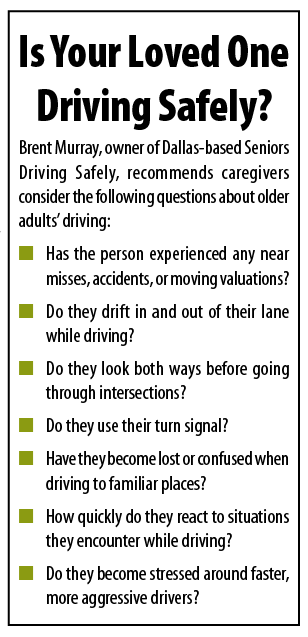When Should an Older Adult Stop Driving?

It’s a conversation no one wants to have: Whether an older adult in the family should retire from driving. Many adult child caregivers delay the conversation until they fear their loved one’s driving has become unsafe.
“There’s never a perfect time to discuss whether someone should retire from driving because you’re talking about someone’s independence,” said Brent Murray, owner of Seniors Driving Safely, a Dallas-based company that provides independent driving safety assessments.
One in five drivers is over age 65, according to the U.S. Department of Transportation. And, according to the AAA Foundation for Traffic Safety, crash rates begin to increase as drivers reach their late 60s or early 70s, rising more rapidly after about age 75, according to the AAA Foundation for Traffic Safety. AAA offers a self-rating tool for older drivers, along with resources for finding independent assessments.
So how do you get an older adult to agree to having someone evaluate their driving?
Have the conversation, but approach the topic with sensitivity, Murray said. He recommended calmly bringing up specific examples of any concerns about the person’s driving. Did they drift out of their lane? Forget to use their turn signal?
“Bring up details and say, ‘Mom or Dad, I noticed you’re not centering in your lane. I see some driving issues, and we’d really like for you to take an independent assessment,’” Murray suggested.
Emphasize the purpose of an assessment is to protect the person and their assets. Murray said many seniors have not considered the financial implications that could result from an accident.
“I tell them, ‘You want to retire from driving when you still have a clean driving record, without any accidents or moving violations,’” he said. “‘You do not want to be forced to retire from driving by a court or plaintiff’s attorney. You want to do it on your own terms.’”
In addition, he said it is important to discuss the fact that people become increasingly fragile as they age, making injuries more likely.
When all else fails, families can bring in a third party to discuss an older adult’s driving.
“I am looking out for the best interests of everyone involved and can be the ‘bad guy’ if I feel the senior driver should no longer be on the road,” Murray said.
He said he tells clients — some of whom are referred by physicians after dementia or Alzheimer’s diagnoses — that it is better to retire from driving voluntarily than to be forced.
“Independence is important to everyone, and it can be extremely difficult for people to accept the changes no longer driving may bring,” Murray said. “When talking to my clients, I bring up examples of athletes when they decide to retire from a sport. They want to retire when they are at the top of their game, leaving a legacy they can be proud of.”
Murray spends about two hours with clients, providing written memory exercises and watching the person drive their regular routes. Assessments do not necessarily lead to retiring from driving, Murray said. He said sometimes seniors often can continue to drive with adjustments, such as restrictions on highway driving, or additional training.
 “Retiring from driving is a very important step in their lives and I do not take that lightly. I make sure the senior understands very clearly why I may recommend they stop driving,” Murray said. “We talk about the route we went on, any issues I noticed with their driving, and any behaviors I saw that day which might endanger their own safety or that of others on the road.”
“Retiring from driving is a very important step in their lives and I do not take that lightly. I make sure the senior understands very clearly why I may recommend they stop driving,” Murray said. “We talk about the route we went on, any issues I noticed with their driving, and any behaviors I saw that day which might endanger their own safety or that of others on the road.”
Retiring from driving does not have to keep a senior from being independent. For example, seniors can use public transportation or services such as Uber or Lyft.
“Many of the seniors I work with already have health care personnel that check up on them and can drive them to the grocery store, pharmacy or doctor’s office as well,” Murray said. “These types of services can be very beneficial in allowing the senior to remain independent without feeling that they are a burden to their family.”
For more information about Seniors Driving Safely, go to www.seniorsdrivingsafely.com.





